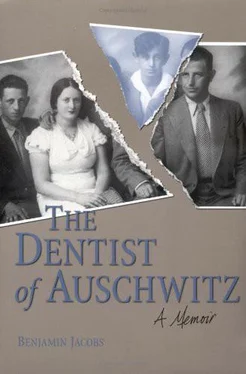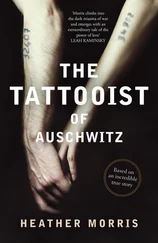Chapter XX
Postwar Germany
Leaving with Hermann helped me to ease the pain of the last five years, and to begin to adapt a new reality. When we left Lüdenscheid most roads were still impassible, especially in the larger cities in Germany. Hermann stopped in Giessen to see some of his prewar colleagues of the SPD, the Sozialdemokratische Partei Deutschland, in which he had once been active. In some cities the Americans wanted us to speak to the German functionaries about our ordeal. As if in a conspiracy of silence, they claimed to a man not to have known about any concentration camp or death camp. Hermann and I talked a lot about that. I got to know Germany’s peculiarities and its diversities. He knew the country well—and knew when not to believe the Germans.
When we came to his family in Ahlberg, I witnessed true happiness. His wife sobbed with joy when she saw him. The children would not let go of him the whole day. Soon his German SPD friends came, glad that he had survived. They were to rebuild the Gewerkschaften, the labor unions, which were outlawed by the Third Reich. I went with Hermann to a few of their meetings. I soon felt that it was time for me to leave. But where would I go? America always was the country of my dreams. I still wanted to reach France, from which I thought to have a better chance of getting to the United States.
Hermann and I had only the one car, but we solved that problem. The American army Major, in charge of Núremberg called the depot where confiscated automobiles were housed and ordered the men there to give us any car we chose. I saw a 1936 Adler cabriolet. Hermann Josef agreed to keep the Fiat, and I took the Adler. An automobile registration was still unavailable, so I tied the sign to identify me as a former KZ-nick to the front grill of the Adler. The next day I began my journey to France. It was the middle of June and very warm. Mrs. Josef packed some food, and I took a few German marks with me. The real currency in Germany then, however, was nylon stockings, chocolate, and American cigarettes. The road south wound through the rolling hills of Bavaria. Driving with the top of the Adler down, I could smell the pristine country air. Along the road, set wide apart, were spacious homes, draped with wide verandas. None bore any scars of war.
Then I saw two boys on the road waving their arms. Their colorful clothes reminded me of circus clowns. Coming closer, I saw Stars of David on their shirts. I stopped and asked them who they were. At first I frightened them. They didn’t know if I was a friend or a foe. But when I told them who I was, they relaxed. Akiva was from Budapest, and his companion, Yaakow, who had a slightly swollen cheek, was from Iai, Romania. They were both sixteen and had recently been freed from Dachau. I asked them if they had relatives. To this they twirled their index fingers unemotionally up to the sky, showing that their families had been killed at the chimneys. They feared being sent back to their countries and were not sure where else to go. They had strayed around for a month, living on what the GIs gave them and sleeping in the forests. I asked them if they would want to come with me to France, and they readily agreed.
For the next few days we lived like vagabonds, roving, rambling, not knowing where our next meal would come from. We stopped at ponds and streams and washed up amid the blossoming lily pads that covered them. On hot days we swam in the clear waters. We halted at American army depots, where we watched, fascinated, as soldiers tossed a little white ball with stitched seams while others caught it in strange-looking, big brown gloves. On some evenings we sat among them and listened to their portable radios playing the Big Band sound. All this was new to us. On cool nights we would stop at a church, a rectory, or a monastery, where we were allowed to sleep. After several days we arrived at the northern tip of Lake Constance, or the Bodensee, as the locals call it. To the south, amid green, gently rolling hills and breathtaking snowcapped mountains, were colorful chalets. In time Akiva and Yaakow felt as if I were their older brother, and to me they were “my boys.”
Yaakow’s cheek kept on swelling. He needed help. I only had a few marks, not enough to pay for a dentist’s service. At the edge of the Black Forest we came to a town called Tuttlingen. We stopped at the first dentist’s office. When the dentist learned who we were, he did the procedure free, extracting Yaakow’s bicuspid. He used a brand of equipment called Simmons, which reminded me of the equipment of Fürstengrube.
The next day we were on a road in the Alps, leading to the Alsace-Lorraine region of France. It wound around the mountains like a roller coaster. Suddenly we saw two men in French army uniforms with bundles on their backs. I asked them where they were going, and they said they had been prisoners of war in Germany and were now returning home. I offered to take them with us, and they readily accepted. They were pleased not to have to struggle up the road, and we hoped that having them with us would be of benefit at the border. In the next two days we shared food, and we became good friends. I also managed to improve my French.
At the border, French soldiers stopped us, and we were escorted to their headquarters, in a magnificent mansion. We followed them into the driveway, and the five of us were led to an office. We passed a hallway lined with light-colored mosaic marble. On the floor lay Oriental rugs. A circular staircase led to large mahogany doors. There some army officers, including women, gathered around us, curious to know who we were. Our two French companions acted as if they were at home.
We were celebrities and were invited to dine with them and, of course, to stay the night. At dinnertime we were led into a large Louis XV-style dining room, where twenty chairs sat around a heavy mahogany table covered with a snow-white damask tablecloth. A large crystal chandelier hung over the table from a nine-meter-high ceiling. Fine china and crystal dazzled our eyes, and carafes of red wine stood spaced in the middle of the table. Soon the room filled with decorated French officers. Then a statuesque-looking gentleman entered. He was the commanding officer of the army division stationed in Alsace-Lorraine, a lieutenant general.
As he sat down at the head of the table, everyone else also assumed places. Our two new friends translated his questions and comments into German for us. Now and then someone raised a toast, and though we didn’t comprehend why, we lifted our glasses and drank the wine with everyone else. I felt nothing strange until it was too late. Even before the first dish was served, Yaakow and Akiva’s heads slumped on the table. I tried to force myself to keep my eyes open, but everything around me began spinning as if I were sitting on a fast carousel. I passed out. When I awoke it was morning. I lay in a large building on straw, covered with army blankets. Next to me were my boys. We shared the quarters with several sleeping French soldiers.
I walked out of the building and stopped a passing soldier, asking him where our interpreter friends, the two Frenchmen, were. He didn’t seem to know. I looked everywhere but could not find them. It seemed as if the two former prisoners of war had disappeared. Then I asked where my car was, but no one seemed to know that either. Finally I went to the office. One soldier made a few telephone calls, and what he told me sounded incredible. “The two ex-prisoners collaborated with the Germans during their internment,” he said. “They are under arrest.” We were not allowed even to say adieu.
It took over an hour for us to find our car, which now had a nearly empty tank. “You have to return to the American Zone and apply for a visa there before you can go to France,” a soldier said. I appealed to him, begging him to let us at least go to Strasbourg and apply there. “There aren’t any French consulates in Germany,” I said. This we could not do either, he said. He made it unequivocally clear that we had to go back, and so we did.
Читать дальше












